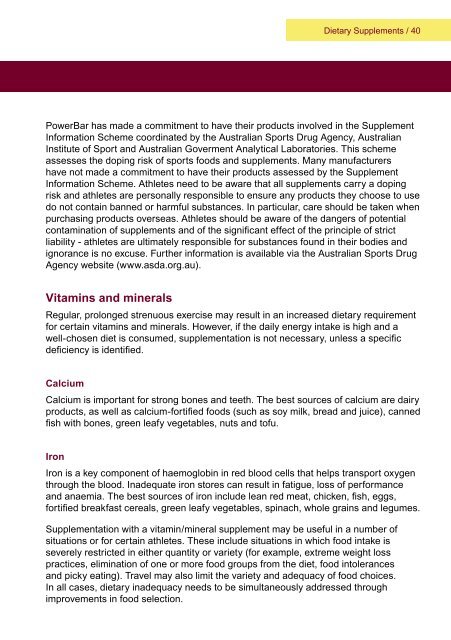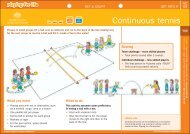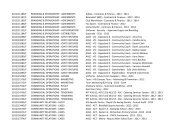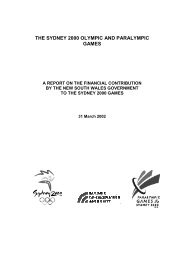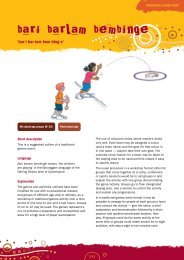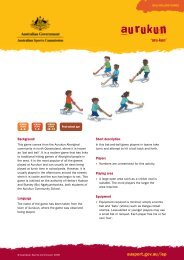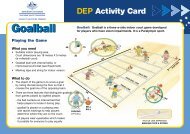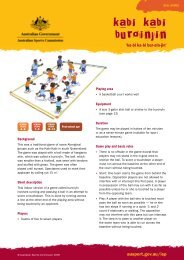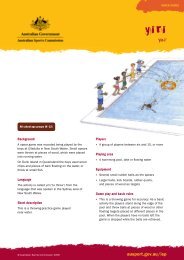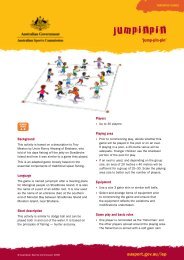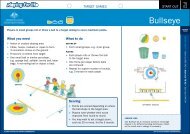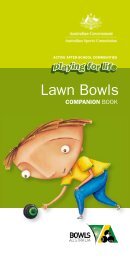Current Concepts in Sports Nutrition - Australian Sports Commission
Current Concepts in Sports Nutrition - Australian Sports Commission
Current Concepts in Sports Nutrition - Australian Sports Commission
Create successful ePaper yourself
Turn your PDF publications into a flip-book with our unique Google optimized e-Paper software.
Dietary Supplements / 40<br />
PowerBar has made a commitment to have their products <strong>in</strong>volved <strong>in</strong> the Supplement<br />
Information Scheme coord<strong>in</strong>ated by the <strong>Australian</strong> <strong>Sports</strong> Drug Agency, <strong>Australian</strong><br />
Institute of Sport and <strong>Australian</strong> Goverment Analytical Laboratories. This scheme<br />
assesses the dop<strong>in</strong>g risk of sports foods and supplements. Many manufacturers<br />
have not made a commitment to have their products assessed by the Supplement<br />
Information Scheme. Athletes need to be aware that all supplements carry a dop<strong>in</strong>g<br />
risk and athletes are personally responsible to ensure any products they choose to use<br />
do not conta<strong>in</strong> banned or harmful substances. In particular, care should be taken when<br />
purchas<strong>in</strong>g products overseas. Athletes should be aware of the dangers of potential<br />
contam<strong>in</strong>ation of supplements and of the significant effect of the pr<strong>in</strong>ciple of strict<br />
liability - athletes are ultimately responsible for substances found <strong>in</strong> their bodies and<br />
ignorance is no excuse. Further <strong>in</strong>formation is available via the <strong>Australian</strong> <strong>Sports</strong> Drug<br />
Agency website (www.asda.org.au).<br />
Vitam<strong>in</strong>s and m<strong>in</strong>erals<br />
Regular, prolonged strenuous exercise may result <strong>in</strong> an <strong>in</strong>creased dietary requirement<br />
for certa<strong>in</strong> vitam<strong>in</strong>s and m<strong>in</strong>erals. However, if the daily energy <strong>in</strong>take is high and a<br />
well-chosen diet is consumed, supplementation is not necessary, unless a specific<br />
deficiency is identified.<br />
Calcium<br />
Calcium is important for strong bones and teeth. The best sources of calcium are dairy<br />
products, as well as calcium-fortified foods (such as soy milk, bread and juice), canned<br />
fish with bones, green leafy vegetables, nuts and tofu.<br />
Iron<br />
Iron is a key component of haemoglob<strong>in</strong> <strong>in</strong> red blood cells that helps transport oxygen<br />
through the blood. Inadequate iron stores can result <strong>in</strong> fatigue, loss of performance<br />
and anaemia. The best sources of iron <strong>in</strong>clude lean red meat, chicken, fish, eggs,<br />
fortified breakfast cereals, green leafy vegetables, sp<strong>in</strong>ach, whole gra<strong>in</strong>s and legumes.<br />
Supplementation with a vitam<strong>in</strong>/m<strong>in</strong>eral supplement may be useful <strong>in</strong> a number of<br />
situations or for certa<strong>in</strong> athletes. These <strong>in</strong>clude situations <strong>in</strong> which food <strong>in</strong>take is<br />
severely restricted <strong>in</strong> either quantity or variety (for example, extreme weight loss<br />
practices, elim<strong>in</strong>ation of one or more food groups from the diet, food <strong>in</strong>tolerances<br />
and picky eat<strong>in</strong>g). Travel may also limit the variety and adequacy of food choices.<br />
In all cases, dietary <strong>in</strong>adequacy needs to be simultaneously addressed through<br />
improvements <strong>in</strong> food selection.


